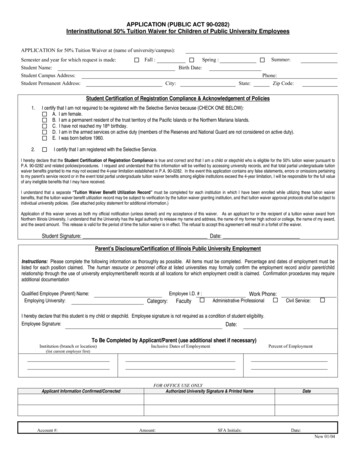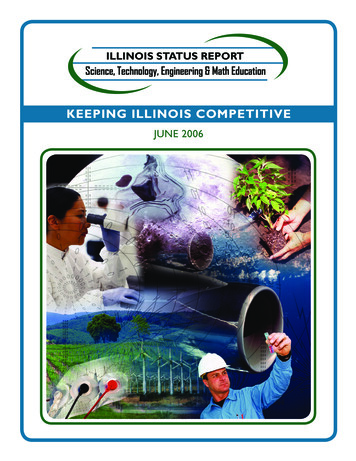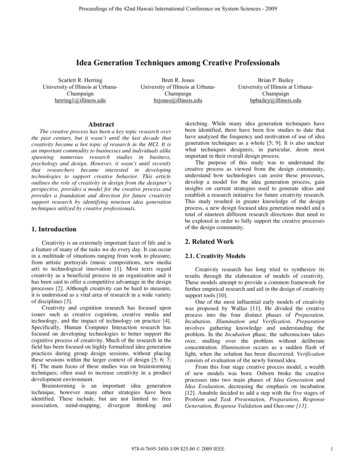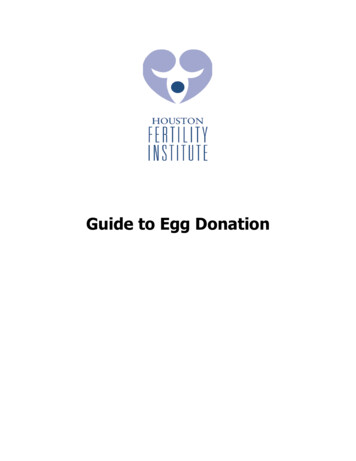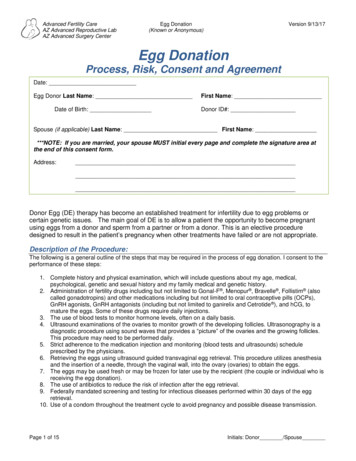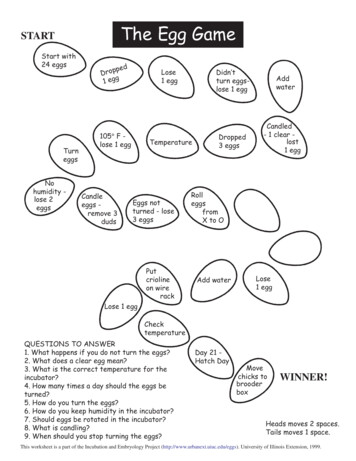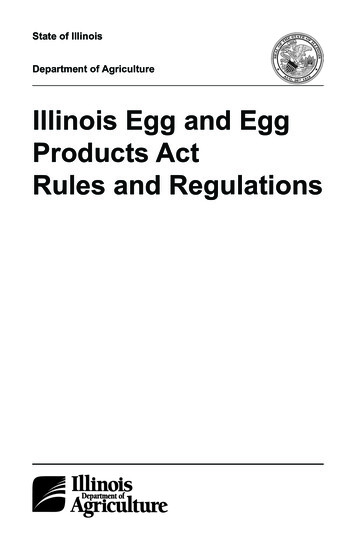
Transcription
State of IllinoisDepartment of AgricultureIllinois Egg and EggProducts ActRules and Regulations
Table of ContentsPart IPart IIIllinois Egg and Egg Products Act. 2Rules & Regulations. 21Object of the Illinois Egg LawThis law has been developed and improved for the benefit of producers,grading stations, distributors, retailers, and consumers alike. Requirementsinclude candling for quality, grading for size, and honesty in labeling. Withthese basics, both the retailer and consumer may specify and be assured ofgetting the kinds of eggs that meet their needs.Points to RememberFirstThe Federal standards and grades for shell eggs are official foreggs offered for sale in Illinois.Second All eggs received by retailers must be prepackaged in newconsumer containers.ThirdCartons must show grade and size of eggs plus identifiableorigin, and pack date.Fourth Eggs offered for sale as “fresh eggs”, or by any other words ofsimilar meaning must meet the minimum requirements of GradeA.FifthAll eggs bearing a designated grade or size must be held at atemperature not to exceed 45 degrees Fahrenheit and kept fromfreezing, until they reach the consumer.SixthBecause eggs are a perishable item of food and the preservationof quality a sensitive issue, certain sanitation requirements havebeen included, governing cases, packing material, premises,facilities, vehicles, display cases, etc.Seventh The Illinois Department of Agriculture has been charged withthe responsibility for enforcing this law. Representatives ofthe Department will endeavor to advise and cooperate with allinterested parties to achieve the greatest possible benefits.Eighth This law does not apply to those nest run eggs sold by a producerwhen eggs are produced by his own flock, except where heelects to subject himself to the law’s provisions by engaging inselling eggs for public consumption.1
Illinois Egg and Egg Products Act410/ILCS/615615/1. Short TitleSec. 1. This Act may be cited as the Illinois Egg and Egg Products Act.(Source: P.A. 86 1475.)615/2. Legislative PolicySec. 2. It is hereby declared to be the policy of the General Assemblyto provide for the inspection of eggs and egg products, place restrictionsupon the disposition of certain qualities of eggs, and provide uniformityof standards for eggs, and otherwise regulate the processing, handling,labeling, and distribution of eggs and egg products as hereinafter prescribedto prevent the movement or sale for human food of eggs and egg productswhich are adulterated or misbranded or otherwise in violation of this Act,and to cooperate with the Federal Government, the several states, andother people to effectively carry out the mandate of this Act.(Source: P.A. 79 678.)615/3. DefinitionsSec. 3. Definitions. For the purpose of this Act, unless the contextotherwise requires, the terms specified in Sections 3.1 through 3.36 havethe meanings assigned to them in those Sections.(Source: P.A. 79 678.)615/3.1.AdulteratedSec. 3.1. “Adulterated” means any egg or egg product under one ormore of the following circumstances:(a) If it bears or contains any poisonous or deleterious substance thatmay render it injurious to health; but in case the substance is not an addedsubstance, the article shall not be considered adulterated under this clauseif the quantity of the substance in or on the article does not ordinarilyrender it injurious to health.(b) If it bears or contains any added poisonous or added deleterioussubstance (other than one which is (i) a pesticide chemical in or on a rawagricultural commodity; (ii) a food additive; or (iii) a color additive) thatmay, in the judgment of the Director, make the article unfit for humanfood.(c) If it is, in whole or in part, a raw agricultural commodity and itbears or contains a pesticide chemical that is unsafe within the meaning ofSection 408 of the Federal Food, Drug and Cosmetic Act.2
(d) If it bears or contains any food additive that is unsafe within themeaning of Section 409 of the Federal Food, Drug and Cosmetic Act.(e) If it bears or contains any color additive that is unsafe withinthe meaning of Section 706 of the Federal Food, Drug, and CosmeticAct. However, an article that is not otherwise deemed adulterated undersubparagraph (c), (d), or (e) shall nevertheless be deemed adulterated ifuse of the pesticide chemical, food additive, or color additive, in or on thearticle, is prohibited by regulations of the Director in official plants.(f) If it consists in whole or in part of any filthy, putrid, or decomposedsubstance, or if it is otherwise unfit for human food.(g) If it has been prepared, packaged, or held under unsanitaryconditions whereby it may have become contaminated with filth, orwhereby it may have been rendered injurious to health.(h) If it is an egg that has been subjected to incubation or the productof any egg that has been subjected to incubation.(i) If its container is composed, in whole or in part, of any poisonousor deleterious substance that may render the contents injurious to health.(j) If it has been intentionally subjected to radiation, unless the use ofthe radiation was in conformity with a regulation or exemption in effectunder Section 409 of the Federal Food, Drug and Cosmetic Act.(k) If any valuable constituent has been, in whole or in part, omittedor abstracted from the egg or egg product; or if any substance has beensubstituted, wholly or in part for the egg or egg product; or if damageor inferiority has been concealed in any manner; or if any substance hasbeen added to the egg or egg product or mixed or packed with the egg oregg product so as to increase its bulk or weight, or reduce its quality orstrength, or make it appear better or of greater value than it is.(l) If the egg is processed in a manner that does not allow theexamination of the content of the individual egg and allows the egg contentto commingle with the egg shell or shell membrane during processing.(Source: P.A. 89 154, eff. 7 19 95.)615/3.2.BrokerSec. 3.2. “Broker” means any person who arranges the transferor ownership of eggs or egg products from one person to another andwho may or may not take possession of such eggs or egg products in theprocess.(Source: P.A. 79 678.)615/3.3.CandlingSec. 3.3. “Candling” means the careful examination, in an adequatelydark room or place, of the whole egg by means of a strong light, the3
apparatus and method employed to be such as shall be approved by thesaid Department.(Source: P.A. 79 678.)615/3.4.CheckSec. 3.4. “Check” means an egg that has a broken shell or crack in theshell but has its membranes intact and contents not leaking.(Source: P.A. 79 678.)615/3.5.Clean and sound shell eggSec. 3.5. “Clean and sound shell egg” means any egg whose shell is freeof adhering dirt or foreign material and is not cracked or broken.(Source: P.A. 79 678.)615/3.6.ConsumerSec. 3.6. “Consumer” means any person who acquires eggs forconsumption by members of his own household, nonpaying guests andemployees, and not for resale.(Source: P.A. 79 678.)615/3.7.Consumer size containerSec. 3.7. “Consumer size container” means any case, carton, sleeve, orother container approved by the Department which is used to market eggsto consumers.(Source: P.A. 79 678.)615/3.8.DepartmentSec. 3.8. “Department” means the Department of Agriculture of the Stateof Illinois.(Source: P.A. 79 678.)615/3.9.DirectorSec. 3.9. “Director” means the Director of the Department of Agricultureof the State of Illinois.(Source: P.A. 79 678.)615/3.10. Dirty eggSec. 3.10. “Dirty egg” means an egg that has a shell that is unbrokenand has adhering dirt or foreign material, or prominent stains on the shellsurface, or moderate stains covering more than 1/4 of the shell surface.(Source: P.A. 79 678.)4
615/3.11. DistributorSec. 3.11. “Distributor” means any person who sells eggs to retailersor institutional consumers and shall include any person distributing eggsto his or to its own retail outlets or stores, but not including any persononly engaged in the hauling or transporting of eggs.(Source: P.A. 79 678.)615/3.12. Egg productsSec. 3.12. “Egg products” means any liquid, frozen, or dried eggs,with or without added ingredients, excepting products which contain eggsonly in a relatively small proportion or historically have not been, in thejudgment of the Director, considered by consumers as products of the eggindustry, and which may be exempted by the Director under conditions hemay prescribe to assure that the egg ingredients are not adulterated and theproducts are not adulterated and the products are not represented as eggproducts.(Source: P.A. 89 154, eff. 7 19 95.)615/3.13. EggsSec. 3.13. “Eggs” means the shell eggs of the domesticated chicken,turkey, duck, goose, or guinea.(Source: P.A. 79 678.)615/3.14. FacilitiesSec. 3.14. “Facilities” means any room or place, compartment, refrigerator,or vehicle used in handling eggs in any manner.(Source: P.A. 79 678.)615/3.15. Graded eggSec. 3.15. “Graded egg” means an egg which is classified inaccordance with the standards established by the Department, taking intoconsideration the size or weight, quality factors (interior and exterior)including condition of white and yolk, the size and condition of the air celland cleanliness and soundness of shell.(Source: P.A. 79 678.)615/3.16. HandlerSec. 3.16. “Handler” means any person including a producer dealerengaged in the business of distributing or processing eggs or egg productsand may include the receiving, assembling, cleaning, grading, sorting,candling, packing, or otherwise preparing for market and selling of the5
eggs and egg products, or otherwise using any eggs in the preparation ofhuman food.(Source: P.A. 89 154, eff. 7 19 95.)615/3.16a. Hazardous disease infected flockSec. 3.16a. “Hazardous disease infected flock” means a flock ofchickens that has been found to be infected with salmonella or anotherpoultry disease that may be injurious to the health of humans.(Source: P.A. 89 154, eff. 7 19 95.)615/3.17. Inedible eggSec. 3.17. “Inedible egg” means any egg of the following description:black rot, yellow rot, white rot, mixed rot (addled egg), sour egg, egg witha green white, egg with a stuck yolk, moldy egg, musty egg, egg showinga blood ring, and an egg containing any embryo chick (at or beyond theblood ring stage), and any egg that is adulterated as that term is definedpursuant to the Federal Food, Drug and Cosmetic Act.(Source: P.A. 89 154, eff. 7 19 95.)615/3.18. InspectorSec. 3.18. “Inspector” means any employee or official authorized toinspect eggs or egg products and to enforce other regulatory measuresnecessary to effectively carry out the mandate of this Act.(Source: P.A. 79 678.)615/3.19. Institutional consumerSec. 3.19. “Institutional consumer” means any restaurant, hotel,boarding house, hospital, nursing home, government institution, or anyother business facility or place in which eggs are prepared or offered asfood for use by its patrons, residents, inmates, or patients.(Source: P.A. 79 678.)615/3.20. LeakerSec. 3.20. “Leaker” means an egg that has a crack or break in the shelland shell membranes to the extent that the egg contents are exposed or areexuding or free to exude through the shell.(Source: P.A. 79 678.)615/3.21. LossSec. 3.21. “Loss” means an egg that is unfit for human food becauseit is smashed or broken so that its contents are leaking; or overheated,frozen, or contaminated; or an incubator reject; or because it contains a6
bloody white, large meat spots, a large quantity of blood, or other foreignmaterial.(Source: P.A. 79 678.)615/3.21a Lot consolidationSec. 3.21a “Lot consolidation” means the removal of damaged eggsfrom consumer labeled cartons and replacement of the damaged eggs witheggs of the same grade, size, sell-by date, brand, lot, and source.(410 ILCS 615/6) (from Ch. 56 1/2, par. 55-6)615/3.22. Master containerSec. 3.22. “Master container” means any type of box or case made ofplastic, wire, cardboard, or other suitable material, used to distributeconsumer size containers to retailers or institutional consumers or bulk(loose) eggs to institutional consumers.(Source: P.A. 79 678.)615/3.23. Nest run eggsSec. 3.23. “Nest run eggs” means eggs which are packed as theycome from the production facilities without having been washed, sized, orcandled for quality, with the exception that some checks, dirties or otherobvious undergrades may have been removed.(Source: P.A. 79 1415.)615/3.24. Official plantSec. 3.24. “Official plant” means any establishment at which inspectionof the processing of egg products is maintained by the Department underthe authority of this Act or by the United States Department of Agricultureunder authority of the Federal Egg Products Inspection Act.(Source: P.A. 79 678.)615/3.25. PackerSec. 3.25. “Packer” means any person who grades, sizes, candles, andpacks eggs for purpose of resale.(Source: P.A. 79 678.)615/3.26. PersonSec. 3.26. “Person” means and includes any individual, partnership,firm, corporation, producer, exchange, association, trustee, receiver, orany other entity and any member officer, employee, or agent thereof.(Source: P.A. 79 678.)7
615/3.27. ProcessingSec. 3.27. “Processing” means manufacturing egg products, includingbreaking eggs or filtering, mixing, blending, pasteurizing, stabilizing,cooling, freezing, drying, or packaging egg products.(Source: P.A. 79 678.)615/3.28. ProducerSec. 3.28. “Producer” means a person who feeds and houses anynumber of chickens, turkeys, ducks, geese, or guineas and obtains eggstherefrom, but shall not include any person who obtains eggs duringthe hauling, transporting, holding for slaughter, or eviscerating of suchchickens, turkeys, ducks, geese, or guineas.(Source: P.A. 79 678.)615/3.29. Producer dealerSec. 3.29. “Producer dealer” means a producer who candles andgrades eggs of his own production or additional eggs other than hisown production to sell on or off the premises to household consumers,institutional consumers, distributors, manufacturers, or retailers.(Source: P.A. 79 678.)615/3.30. Restricted eggSec. 3.30. “Restricted egg” means any check, dirty egg, incubator reject,inedible, leaker, or loss.(Source: P.A. 79 678.)615/3.31. RetailerSec. 3.31. “Retailer” means a person who buys candled and gradedeggs or egg products from a licensed manufacturer, licensed handler, orlicensed distributor for resale to a consumer only, or who buys candled orgraded eggs or egg products to use in the preparation of other consumerfoods for resale.(Source: P.A. 79 678.)615/3.32. SellSec. 3.32. “Sell” means offer for sale, expose for sale, have inpossession for sale, barter, trade, distribute, market, or traffic in eggs inany manner.(Source: P.A. 79 678.)8
615/3.33. Shell treated eggSec. 3.33. “Shell treated egg” means that the shell has been treatedwith oil or other approved preservative preparation.(Source: P.A. 79 678.)615/3.34. StateSec. 3.34. “State” means the State of Illinois.(Source: P.A. 79 678.)615/3.35. Federal Food, Drug, and Cosmetic ActSec. 3.35. “Federal Food, Drug, and Cosmetic Act” means the Actapproved June 25, 1938 (52 Stat. 1040), as amended.(Source: P.A. 79 678.)615/3.36. Egg Products Inspection ActSec. 3.36. “Egg Products Inspection Act” means the federal Actapproved December 29, 1970 (84 Stat. 1621), as amended.(Source: P.A. 79 678.)615/4. Sale of Unfit eggs or egg productsSec. 4. Sale of unfit eggs or egg products. No person shall sell or offerfor sale eggs or egg products for human consumption that are unfit forhuman food. For the purpose of this Act, an egg or egg product is unfitfor human food if it is classified as an inedible egg or loss egg or, in thecase of an egg product, it is adulterated, unwholesome, non inspected, orotherwise unfit for human consumption. Eggs from a hazardous diseaseinfected flock shall be diverted to egg breaking plants for pasteurizationonly.(Source: P.A. 89 154, eff. 7 19 95.)615/5. Standards for grading and classification of shell eggsSec. 5. The Department, after investigation and public hearing, shallestablish standards for grading and classification of shell eggs according tothe size or weight, quality factors (interior and exterior) including conditionof white and yolk, the size and condition of the air cell and cleanlinessand soundness of shell. In establishing these standards, the Departmentmay follow the standards promulgated by the United States Departmentof Agriculture and may, after investigation and public hearing, amend theIllinois standards from time to time so that the federal specifications can befollowed consistently if so desired. Copies of any standards so established,or any amendment thereof, shall be kept on file in the office of the Director.9
The Department shall promulgate a regulation providing that wheneggs are purchased on a basis of grade yield, a uniform type of report shallbe issued to the producer by the purchaser showing grade yield of eggsthat have been purchased from the producer.(Source: P.A. 89 154, eff. 7 19 95.)615/6. Candling and grading - Sales by hatcheries - Labeling AdvertisingSec. 6. Candling; labeling; sales by producers; retail sales; temperaturerequirements. All eggs sold at retail or purchased by institutional consumersmust be candled for quality and graded for size.A producer may sell on his own premises where eggs are produced, direct tohousehold consumers, for the consumer’s personal use and that consumer’snon paying guests, nest run eggs without candling or grading those eggs.All eggs designated for sale off the premises where the entire flockis located, such as at farmers’ markets, and at retail or for institutionaluse must be candled and graded and held in a place or room in which thetemperature may not exceed 45 degrees Fahrenheit after processing. Nestrun eggs must be held and transported at or below 45 degrees Fahrenheitambient temperature beginning 36 hours after the time of lay.Hatcheries buying eggs for hatching purposes from producers undercontract may sell their surplus eggs to a licensed packer or handlerprovided that the hatchery shall keep records which indicate the numberof cases sold, the date of sale and the name and address of the packer orhandler making the purchase.All eggs candled or candled and graded outside the State must meetFederal standards before they can be sold or offered for sale in the State.No eggs may be offered for sale for consumer use 45 days or more afterthe date of candling.Each container of eggs offered for sale or sold at wholesale or retailmust be labeled in accordance with the standards established by theDepartment showing grade, size, packer identification, and candling date,and must be labeled with an expiration date, or other similar languageas specified by USDA standards, that is not later than 45 days from thecandling date for grade A eggs and not later than 30 days after the candlingdate for grade AA eggs.The grade and size of eggs must be conspicuously marked in bold facetype on all consumer size containers.The size and height of lettering or numbering requirement shall be setby regulation and shall conform as near as possible to those required byFederal law.All advertising of shell eggs for sale at retail for a stated price shall10
contain the grade and size of the eggs. The information contained in suchadvertising shall not be misleading or deceptive. In cases of food bornedisease outbreaks in which eggs are identified as the source of the disease,all eggs from the flocks from which those disease causing eggs came shallbe identified with a producer identification or flock code number to controlthe movement of those eggs.(Source: P.A. 101-158, eff. 7 26 19.)615/7). Sale as “fresh eggs” or words of similar importSec. 7. No person, other than those who sell only eggs produced bytheir own flocks, shall sell, offer for sale or advertise for sale as “fresheggs”, or under any words of similar import such as “new laid eggs”,“hennery eggs”, or “strictly fresh eggs”, any shell eggs which do notmeet the minimum requirements of Grade A prescribed by Departmentstandards for shell eggs.Any person buying eggs from a producer on grade or representing tobuy eggs from a producer on grade shall grade those eggs on the standardsestablished by the Department. Any misgrading for the purpose of fraud ingrading eggs purchased from a producer shall be punished as provided inSection 18 of this Act.(Source: P.A. 89 154, eff. 7 19 95.)615/8. License to buy, sell, trade or traffic in eggs - ExceptionsSec. 8. Any person or business who buys, sells, trades, or traffics ineggs in this State and is a broker, distributor, handler, packer, producer, orproducer dealer, as defined in this Act, must be licensed in this State. Alimited or full license must be purchased annually. No person or businessshall buy, sell, trade, or traffic in eggs in this State without having obtaineda license as provided in Section 9, except the following:(a) a producer who obtains eggs from his own flock, regardless ofthe size of the flock, and sells them as nest run eggs, either to householdconsumers on the premises where the flock is located, or to a holder of anIllinois Egg License;(b) hatcheries which purchase eggs to be used exclusively for hatchingpurposes;(c) institutional consumers where all eggs purchased are served in theestablishment;(d) manufacturers of food products who use all eggs purchased in theirproducts such as bakeries, confectioneries, and ice cream manufacturers,etc.;(e) agents employed and carried on the payroll on a salary basis by .11
licensed dealers or distributors;(f) a consumer buying eggs for his own consumption;(g) a retailer who buys eggs from licensed distributors or fromlicensed handlers only and sells eggs only at retail.(Source: P.A. 92 677, eff. 7 16 02.)615/9. License - Issuance - Fees - ExpirationSec. 9. Licenses; fees. The Department shall issue a license to anyperson upon receipt and approval of a proper application and the requirednonrefundable fee. The license fee and classification of the license shall beestablished by rule.A license must be obtained for each separate business location and thislicense shall be posted in a conspicuous place at the location for which itwas purchased. Licenses are non-transferable.The application for an initial license may be filed at any time prior tobeginning business as an egg handler. The licensing year for an egg licenseshall be July 1 through June 30. The egg license shall expire at the end ofthe licensing year.A penalty of 50 shall be assessed for any renewal license not renewedby July 1 of the year in which the license renewal is due. This penalty shallbe assessed in addition to the license fee.(Source: P.A. 96-1310, eff. 7-27-10.)615/10. Inspection fee - Rate - PaymentSec. 10. Inspection fee. The Director shall set, by regulation, a percase inspection fee which shall cover the administrative and inspectioncosts of the program required by the Act. In no case shall the rate exceed11 per each 30 dozen eggs or fraction thereof.The inspection fee as set shall be imposed upon eggs bearing adesignated size and grade sold or offered for sale in Illinois. The firsthandler in Illinois who packed and sold the eggs must pay the prescribedinspection fee on those eggs. If eggs are shipped into Illinois, the handlerwho invoiced the eggs to Illinois must pay the fee. When the handler sellsthe eggs, the inspection fee shall be charged in addition to the sale priceof the eggs and shall be remitted to the seller by the purchaser. Each salesinvoice shall indicate the amount of inspection fee for the transaction.Eggs sold and shipped out of the State of Illinois by Illinois packers areexempt from the inspection fee.The inspection fee shall be paid only once on the same quantity ofeggs so long as those eggs maintain their identity by remaining in theiroriginal case, carton or package. All inspection fees shall be paid into the“Agricultural Master Fund” to the credit of a special account designated12
as the “Auxiliary Egg Inspection Fund”. All amounts credited to the“Auxiliary Egg Inspection Fund” shall be used for the enforcement of theprovisions of this Act. The method and manner of collecting the inspectionfee levied, whether it be by the use of stamps, monthly reporting andcollecting from dealers or any other method shall be prescribed by theDirector of Agriculture, pursuant to rules and regulations adopted for thispurpose as authorized under the provisions of this Act.(Source: P.A. 92 677, eff. 7 16 02.)615/11.1. (Repealed).(Source: P.A. 80 522. Repealed by P.A. 89 154, eff. 7 19 95.)615/11.2. (Repealed).(Source: P.A. 80 522. Repealed by P.A. 89 154, eff. 7 19 95.)615/11.3. (Repealed).(Source: P.A. 79 1415. Repealed by P.A. 89 154, eff. 7 19 95.)615/11.4. (Repealed).(Source: P.A. 79 678. Repealed by P.A. 89 154, eff. 7 19 95.)615/11.5. Investigations of complaints - Hearing Notice - SubpoenasSec. 11.5. Investigation; notice; hearing. The Department may, uponits own motion or upon the complaint in writing of any person settingforth facts which if proved would constitute grounds for refusal to issueor renew a license or suspension or revocation of a license under this Act,investigate the actions of any applicant or any person or persons applyingfor, holding, or claiming to hold a license.The Department, before refusing to issue or renew or before suspendingor revoking a license shall set a date for a hearing thereon. At least 10 daysprior to the date set for the hearing, the Department shall notify in writingthe applicant for or holder of a license of the date, time, and place of thehearing. Written notice may be served by personal service or by mailingthe same by registered or certified mail. The Director may, after a hearing,issue an order to either issue, renew, suspend, or revoke the license.(Source: P.A. 89 154, eff. 7 19 95.)615/12. InvoicesSec. 12. Each producer dealer, packer, handler or distributor who sellscandled and graded eggs to any retailer, institutional consumer, bakery, orconcern which purchases eggs for serving to guests or patrons thereof orfor its use in preparation of any food products for human consumption,13
shall furnish the purchaser with an invoice or other accounting documentcovering each sale, showing the exact grade and size of the eggs purchased.The handler selling and the purchaser shall each be able to produce acopy of said invoice or other accounting document at his place of businessfor a period of 30 days, during which time the copy shall be availablefor inspection during reasonable business hours by a representative of theDepartment.(Source: P.A. 89 154, eff. 7 19 95.)615/13. Rules and RegulationsSec. 13. The Director shall make rules and regulations necessaryfor the effective administration of this Act. These rules and regulationsshall conform as near as possible but need not be limited by rules andregulations established by federal law in the Egg Products Inspection Act,governing the inspection of eggs.The Director is hereby authorized to cooperate with all otheragencies, Federal, State and municipal, in order to carry out the effectiveadministration of this Act and to establish a trust fund in the appropriateState agencies for receipt and disbursement of cooperative funds from theFederal Government.(Source: P.A. 89 154, eff. 7 19 95.)615/14.1. (Repealed).(Source: P.A. 79 678. Repealed by P.A. 89 154, eff. 7 19 95.)615/14.2. Powers of department and its inspectors and agentsSec. 14.2. For the purpose of carrying out the provisions of this Actand the rules and regulations promulgated thereunder, the Departmentthrough its authorized inspectors or agents is empowered:(a) To enter on any business day during the usual hours of business, anyplace or conveyance within the State where eggs are produced, candled,incubated, stored, packed, delivered for shipment, loaded, shipped,transported or sold;(b) To enter on any business day during the usual hours of business,with or without the presence of the owner, manager, or other responsibleperson, any restaurant kitchen or the kitchen and food storage area of anyother public eating place including but not limited to hotels, boardinghouses, hospitals, nursing homes, government institutions, or any otherbusiness facility or place in which eggs or egg products are stored,prepared, or offered as food for use by its patrons, residents, inmates, orpatients;(c) To enter on any business day during the usual hours of business14
the cooking or food preparation area of any bakery where eggs and eggproducts are used in the manufacture of bakery products, with or withoutthe presence of the owner or persons employed as bakers, or to enter at anytime while those bakery products are being prepared.(d) To sample any eggs or egg products for analysis or testing. Sampleeggs or egg products shall be furnished at no cost to the Department.(e) To inspect all invoices, eggs and egg products, and the casesand containers for eggs or egg products and the equipment found in theplaces or conveyances described in paragraph (a) and to seize and hold asevidence an advertisement, sign, placard, invoice, case or container of eggsor egg products, or all or any part of any pack, load, lot, consignment, orshipment of eggs or egg products packed, stored, delivered for shipment,loaded, shipped, transported, or sold in violation of any provision of thisAct. Possession of a commodity described in this Section by any personengaged in the sale of that commodity is prima facie evidence that thecommodity is for sale.(Source: P.A. 89 154, eff. 7 19 95.)(f) To seize and hold any case or container of eggs or egg productsfrom any person or business who is not licensed under Section 8 of thisAct and is required to be licensed.Possession of a commodity described in this Sec
eggs offered for sale in Illinois. Second All eggs received by retailers must be prepackaged in new consumer containers. . candling, packing, or otherwise preparing for market and selling of the . 6 eggs and egg products, or otherwise using any eggs in the preparation of human food. (Source: P.A. 89 154, eff. 7 19 95.) 615/3.16a. Hazardous .
